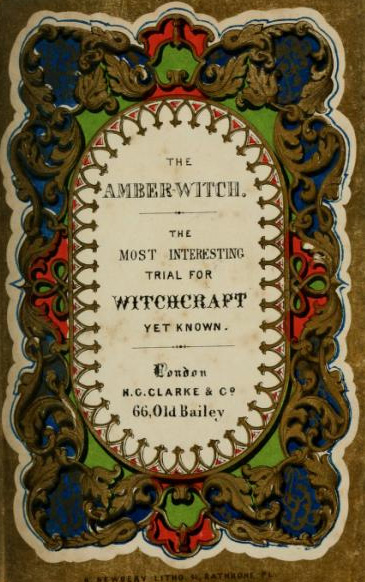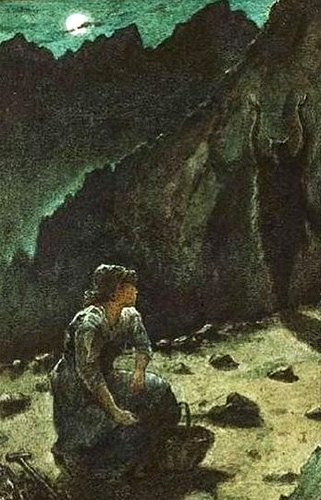
An odd title, and a sometimes lurid story, belie a backstage controversy with this novel. Written in 1839 as Maria Schweidler: Die Bernsteinhexe, it was translated into English in 1844 and was an immediate sensation, largely because it was being passed off as a genuine account of a witchcraft trial!
Meinhold, a Lutheran clergyman, claimed to have discovered a forgotten manuscript by Abraham Schweidler, a pastor in the German town of Koserow, on the Pomeranian coast of Baltic Sea near the Polish border, during the Thirty Years' War (1618-1648). He even provided space for "missing" pages at the beginning and end that don't interfere with the story.
Koserow is overrun with troops and THE AMBER WITCH starts off as a tale of wartime survival, as enemy soldiers destroy houses and ruin crops. There's one run of bad luck after another, and when things finally settle down again, there's problems with suspected witchcraft and possible supernatural activity, including the lurid "Gallows Ghost" episode:

(THE AMBER WITCH was a great favorite of the Pre-Raphaelites, and this is one of a set of illustrations by Philip Burne-Jones.)
It's amusing for this to turn out to be totally mundane, a case of highway brigands using peasant superstitions against them, and the culprit identified as mortal when his foot flattens a horse turd while he's chasing a wagon.
Anyway, Pastor Schweidler and his impossibly virtuous and pious daughter Maria happen on unexpected wealth when they chance upon a rich vein of amber in the hills near town. They take it into the nearest city to sell, and buy good clothes for themselves and food for the poor townspeople. However, this attracts the attention of the local sheriff, whose attentions Maria spurns, and a bitter, jealous old woman of the town.
Soon, bizarre things begin to happen. Animals die, crops fail, and a pregnant woman gives birth to a winged imp (offstage, and never presented as anything other than a rumor). And Maria is accused of consorting with specters in the hills.

The resulting trial, and the revelations that come after, are the real thrust of the story.
It's a bit hard to read; Meinhold took great care to duplicate the phrasing and style of someone of the period, (effectively translated by Lucy, Lady Duff Gordon) which can make for turgid reading at times. And Pastor Schweidler is not always very likable; while well-intended, he's also judgmental and snobbish. When a noble dismisses the notion of witchcraft as superstition, the Pastor immediately dubs him an "atheist." And he's something of a hypocrite; while they do provide food for the poor with their gains from amber, they keep most of the money for themselves and keep the location of the vein secret.
But it's the witchcraft you read this for, and it's sometimes a bit of an adventure to figure out if it's really happening or just superstitious interpretations of natural phenomena.
THE AMBER WITCH was a hit in its time and it wasn't until Meinhold was quizzed about it by King Frederick William IV of Prussia that he admitted it was a hoax. Until then, the novel was taken seriously by historians and was being dramatized for stage, and even made into an opera by composer William Vincent Wallace and librettist Henry Fothergill Chorley. Meinhold's popularity crashed in Germany after he admitted the hoax and his second significant novel, SIDONIA VON BORK, was ignored in his native country (but published in a deluxe edition by William Morris' Kelmscott Press). Meinhold passed away in 1851 in Berlin.
This is one of the books in E. F. Bleiler's collection FIVE VICTORIAN GHOST NOVELS, although it's not really a ghost novel....




No comments:
Post a Comment